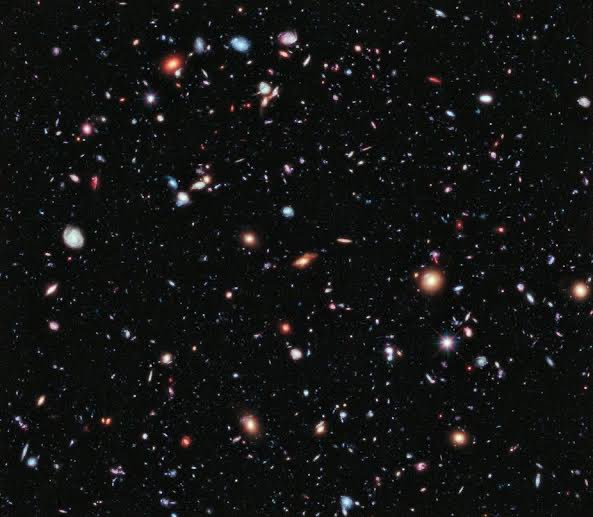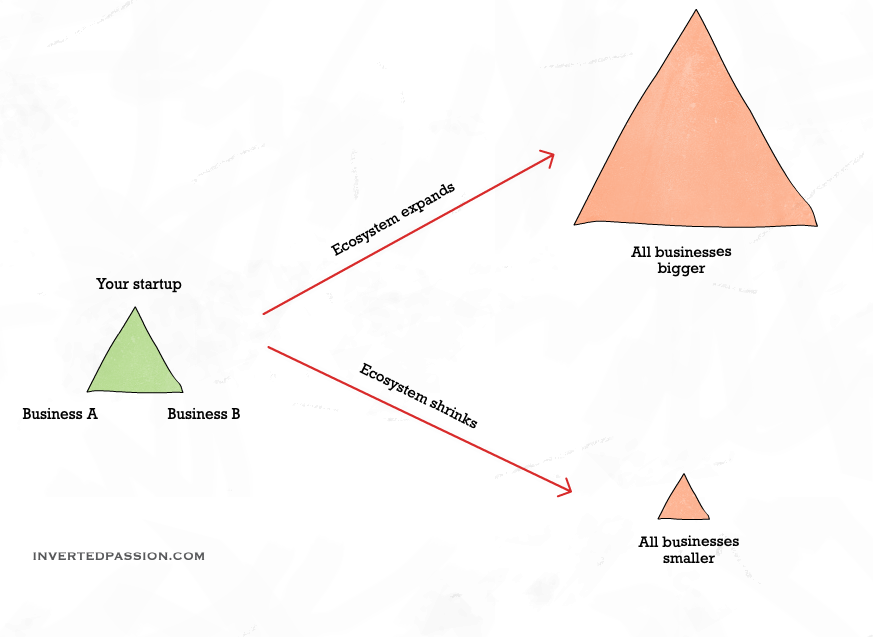
1/ I learned so much from this recent paper by @tobyordoxford (h/t to @anderssandberg for tweeting)
This thread is based on that paper, so if you’re intrigued, highly recommend reading the entire thing arxiv.org/pdf/2104.01191…
This thread is based on that paper, so if you’re intrigued, highly recommend reading the entire thing arxiv.org/pdf/2104.01191…
2/ One of the most awe-inspiring insights from the paper is that many of the galaxies we see in the Hubble deep field image are FOREVER beyond our reach.
I don’t mean just practically, but even theoretically.
I don’t mean just practically, but even theoretically.
3/ We can see a distant galaxy but we can never reach it.
Why?
Because our universe is expanding and this expansion is accelerating.
Why?
Because our universe is expanding and this expansion is accelerating.
4/ The distance between Earth and the distant galaxy was much less when the light left that distant galaxy than it is now.
And if we start travelling towards it at light speed we’d never be able to reach it because the space between us is expanding even faster.
And if we start travelling towards it at light speed we’d never be able to reach it because the space between us is expanding even faster.
5/ The most important insight from the accelerated expansion of universe is that we can only affect 5% of the universe we can observe. 

6/ The term “observable” universe comes from the fact that since the time of Big Bang (13.8 billion years ago), there has only been a finite right of space around Earth from which light has had time to reach us.
7/ So even though universe most likely extends much, much beyond the observable universe, we can’t see anything from our telescopes beyond this sphere of 400 billion galaxies (which is 46 billion light years in radius)
8/ Counter-intuitively, as time passes because light gets more time to reach us, our observable universe grows in size but because space is expanding, the affectable universe shrinks.
Which means each year, we can observe more galaxies but reach fewer of them.
Crazy, isn’t it?
Which means each year, we can observe more galaxies but reach fewer of them.
Crazy, isn’t it?
9/ From @tobyordoxford’s paper, I also learned about “cosmic time dilation”.
Which is that as space expansion accelerates, since light takes longer and longer to reach us and hence distant events appear slower and slower.
Which is that as space expansion accelerates, since light takes longer and longer to reach us and hence distant events appear slower and slower.
10/ Look at the Hubble deep field image again.
The most distant galaxies here are 30 billion years away, which means they’re forever out of our reach (outside affectable universe of 16 billion years).
The most distant galaxies here are 30 billion years away, which means they’re forever out of our reach (outside affectable universe of 16 billion years).

11/ Also, the further the galaxies are from us, the closer to Big Bang they would have formed.
So at the very edges of our observable universe, we actually don’t see galaxies but proto-galaxies or plasma (yet to condense into galaxies)
So at the very edges of our observable universe, we actually don’t see galaxies but proto-galaxies or plasma (yet to condense into galaxies)

12/ And because of cosmic time dilation, it’ll appear that the furthest galaxies are frozen in time!
Nothing ever happens at the edge of our universe (from our point of view).
Nothing ever happens at the edge of our universe (from our point of view).
13/ Another crazy implication: as we can the sky for intelligent life, if we observe them outside of affectable universe (which is 95% of all observable universe), we’d never be able to interact with them.
So we’d know they exist and are likely thriving but we can never say hi!
So we’d know they exist and are likely thriving but we can never say hi!
14/ If you’re in the mood to watch a video, here’s one by @SEA_YT__ that captures these mind bending implications pretty well
15/ That’s it.
Hope you enjoyed it.
If you know of more humbling or awe inspiring implications of the cosmic scale, do reply!
Hope you enjoyed it.
If you know of more humbling or awe inspiring implications of the cosmic scale, do reply!
16/ Typos correction:
“there has only been a finite radius* of space around Earth from which light has””
“as we scan* the sky for intelligent life”
“there has only been a finite radius* of space around Earth from which light has””
“as we scan* the sky for intelligent life”
• • •
Missing some Tweet in this thread? You can try to
force a refresh






